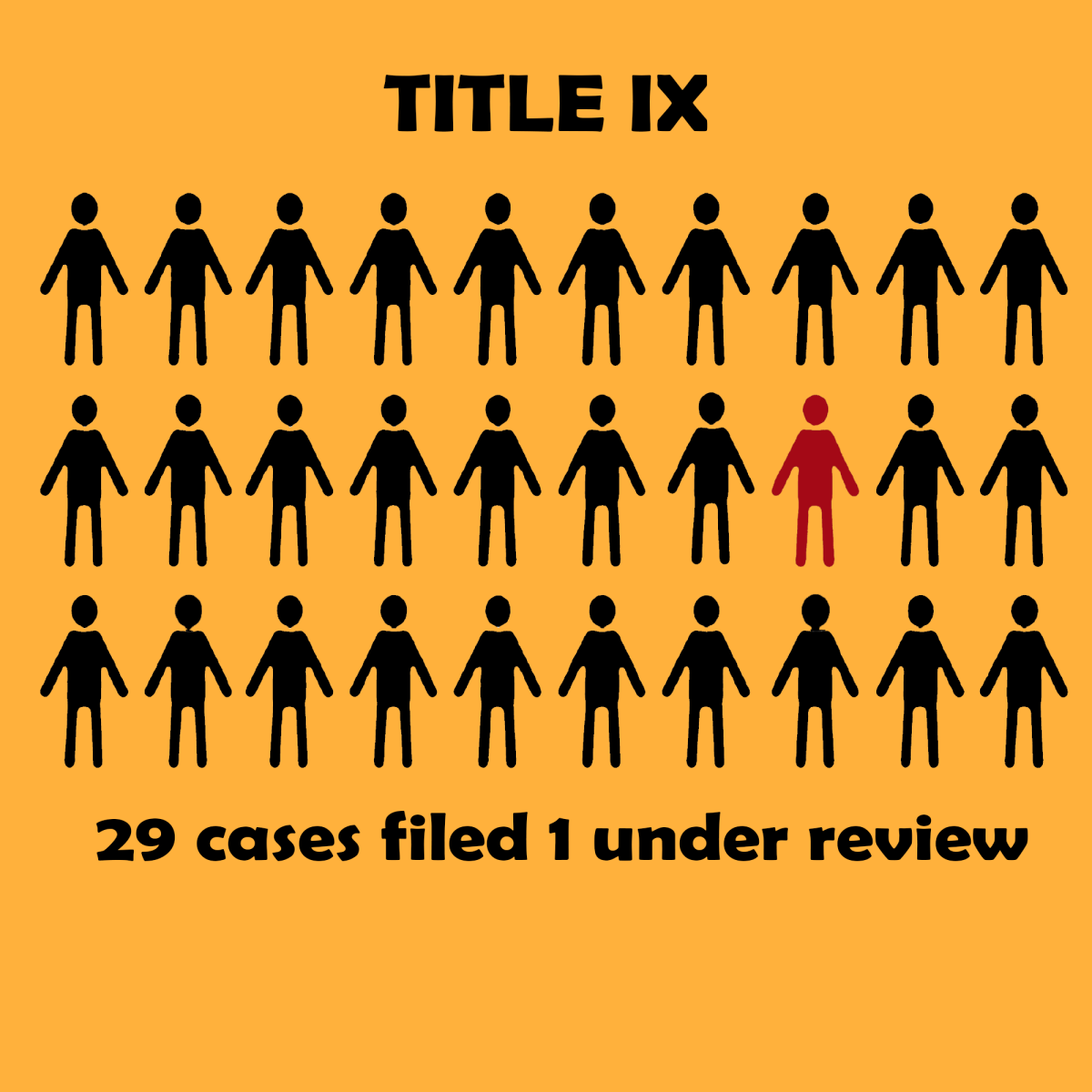Trinity University’s annual chief executive officer (CEO) report indicated that, after students reported 29 cases involving sexual harassment, sexual assault, dating violence or stalking to the Title IX office, the office investigated one case, having determined the other 28 cases to not require further inquiry.
This CEO report was released and ratified by Vanessa Beasley on Oct. 19 amid the ongoing search for a permanent Title IX coordinator. For the time being, the compliance officer/interim Title IX coordinator position is held by Kateeka Harris, who works off campus through a third party and has years of experience in Title IX compliance departments.
In the search for the next official Title IX coordinator, the university established a committee to lead the charge in selecting a new individual for the role. Led by Eric Maloof, vice president for enrollment management, the panel includes individuals from various areas of campus life such as student affairs, human resources, athletics and academic affairs.
The search committee is responsible for selecting an individual who can meet the significant demands of the position. Andrew Wells, vice president of student affairs, worked directly with Title IX office at Macalester College before coming to Trinity. President Vanessa Beasley deferred questions to Wells. Through his past position, he understands the burden that this job requires.
“This is a position where the constituency is everyone. … This is a high-level position. It’s a hard job. And so I think the Title IX coordinator job is the hardest job on campus,” Wells said.
In the interim period, Trinity’s membership in the Independent Colleges and Universities of Texas (ICUT) gives the institution access to a contract with Grand River Solutions, an organization that works with educational institutions to improve and supplement various services on campuses. Through this system, Kateeka Harris began her position at Trinity on June 30.
Initially working as a probation officer in the northeast, Harris has an extensive amount of background in Title IX. Having worked in Title IX compliance administration since 2006, Harris currently fulfills the responsibilities of the position while also helping set up for the next coordinator. To do so, she is working on a transition document for the next individual in the position and is looking to improve Trinity’s Maxient system, a program for submitting and tracking student conduct cases.
At the beginning of her time at Trinity, Harris looked through the history of the Title IX office and considered what direction it ought to go in the future. Given her expansive background on the subject, she was able to speak about the areas of growth that the office should build upon.
“There’s some opportunities for growth and development of the office, and also an opportunity to create more partnerships across the campus,” Harris said. “That’s one thing that I’ve noticed—that it’s very siloed. It’s a very siloed office, and in my experience, that’s not how it should be. It should be an office that collaborates with every area because you deal with employee issues and you deal with student issues. You just need to be well-connected.”
In the process of acclimating to Trinity, Harris met with some students and faculty to understand the culture of the campus. One student is Lauren Hurley, senior mathematical finance and economics double-major, who serves as risk chair for both Alpha Chi Lambda and Greek Council. As a part of her position, she met with Harris to discuss risk-related procedures and plans. Despite currently being based in Dallas and working on campus for 10 hours a week, Hurley is optimistic about Harris’ position going forward.
“She seemed very dedicated to her role. She seemed very open. She told me to have meetings with her whenever I wanted to. I do know that she works remote a lot, but she said the great thing about working remote is that she can hop on a Zoom at 10:00 p.m, and so she seemed very ready and dedicated in her role,” Hurley said.
The varying perspectives of students show that the Title IX office has a wide variety of impacts. An anonymous student source detailed their experiences with the office in the past year. While in a dangerous relationship, they reached out to their professor and received advice on the next steps to take.
“I was hiding in a bathroom, and I called one of my professors to ask for an extension on a project because I didn’t have my computer with me,” the anonymous source said. “I began talking about my situation and what was happening. And she was the one who advised me not to report his name because she was worried that was going to put me in a dangerous situation.”
As time passed, the student eventually reached out to their resident assistant, a mandatory reporter, as their partner was making them feel unsafe and waiting outside their door. The Title IX office reached out and asked to schedule an appointment. Given the severity of the situation, the individual declined the appointment and instead sought help elsewhere.
“I just did not get a really supportive response, and it made me feel like it was my fault,” the anonymous source said. “And then because I didn’t want to come in, that, that was inconveniencing them in some way. But I was really afraid for my life, and I wasn’t eating, and I wasn’t sleeping and so the last thing I needed was to go have a meeting.”
Handling students in these situations is one facet of what the Title IX office monitors. Made up of a single individual—the compliance officer/Title IX coordinator—the Title IX office presides over a full breadth of duties. Not only do they oversee all matters related to Title IX, but they are also in charege of issues related to other federal regulations such as Title VI and VII, which revolve around protecting individuals from discrimination in federal assistance-related matters and employment. Jamie Thompson, interim associate vice president and dean of students, discussed the office and its progress since it became officially established.
“Prior to May of 2019, we didn’t have a standalone Title IX coordinator, which meant that that was an add-on to someone else’s job,” Thompson said. “They were doing other work and this … institution made an investment and directed resources to this work and prioritize this work. So there’s an individual that students and employees can find and understand resources and really be able to wrap our arms around that so that’s something that still, you know, if I’m being honest, is relatively new for us.”
With the newness of the office, the statistics in the report reflect how it has fit into the Trinity community so far. The CEO report covers data from July 1, 2022, to June 30, 2023, coinciding with numbers from the annual security report, showing four cases of dating violence in 2022. Additionally, the annual security report the year prior reflects similar numbers to the most recent report, where 62 reports were filed and disciplinary processes were not initiated. This year’s annual security report will be released by the University by the end of the year, so the offenses that overlap with Title IX remain to be seen.
The future of Title IX at Trinity continues to develop, with the university aiming to improve the position with the next individual who spearheads the office. Once the next Title IX coordinator is selected, there is a planned period of transition where Harris will work with the new coordinator. When looking at the immediate future, Harris remains ready to improve what she can for both today and tomorrow.
“It’s important for students to know that the Title IX office is here for you. It’s an office for all people,” Harris said. “It’s really about making sure that folks can experience this institution without discrimination, regardless of if it’s based on sex or gender or age or race or whatever. I think that there’s an opportunity for students to engage with the office and even be involved in what the formulation of that office is going to look like.”
*Due to the sensitivity of the situation, the student talking about their Title IX experience requested to remain anonymous.










Alex Gallin-Parisi (she/her) • Nov 10, 2023 at 9:14 am
I support the Trinitonian reporting on this issue and continuing to illuminate the publicly available records of cases deemed not worth initiating investigations. It is an absolute disgrace that the Title IX office be staffed by one individual. Moreover, while I undountedly agree that the process and issues are complicated and onerous, the fact that we can’t get our act together by now; that we didn’t even have this position until 2019; and that the University seems to be placing the burden on the shoulders of ONE PERSON, Kateeka Harris, instead of looking at historical, structural issues at the University… this is news worth reporting even though it makes me feel ashamed as a faculty member. We can talk til our voices are raw about equity and belonging and justice and community, but unless we collectively decide that we WILL NOT STAND for gendered harassment, unequal treatment, gender violence, and fear, we are hurting our students and wasting our time pretending we are something we are not.